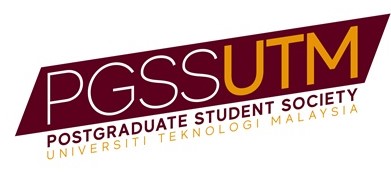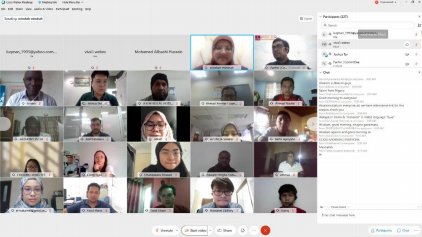On March 31st 2021, an online structured course entitled Mendeley Reference Management System (RMS) was organized to share how RMS helps in managing and structuring research sources. The structured course started at 9.00 am and ended at 11.40 am using Cisco WebEx online conferencing platform. This course was organized by the Postgraduate Student Society School of Computing (PGSS-SC), with Muhamad Farhin Harun as the moderator.
This session was successfully held with the PGSS-SC committee’s help Muhammad Zafran Muhammad Zaly Shah, Asraful Syifaa’ Ahmad, and Muhammad Luqman Mohd Shafie. This course received 673 online registrations, and 387 participants turned up for the event. However, 352 participants registered during the structured course. There are 47.6% Ph.D. students, 33.71 % Master degree students, 1.41 % Bachelor students, and the rest are unidentified. We also received participation from UTM staff. Additionally, 95.46 % are from UTM, and the rest is non-UTM.
The honorable speaker for the program is Associate Professor Dr. Noorminshah Binti A. Iahad. She is an associate professor in the Department of Information Systems, Azman Hashim International Business School (AHIBS) UTM. Moreover, she is currently the IT Manager at the office of Deputy Vice-Chancellor (Research & Innovation). She is also a member of the Institute of Electrical and Electronics Engineers (IEEE). Previously, she held the position of the Secretary of Malaysia Association for Information Systems. Dr. Noorminshah graduated from her undergraduate study from the University of Malaya, Kuala Lumpur, Malaysia. She had been exposed to web-based application development since her Industrial Application practice in 1999. She joined the Information Systems Department at the Universiti Teknologi Malaysia as a tutor in 2000. She had a year of teaching experience before continuing her studies for MSc in Information Systems Engineering at the Computation Department, University of Manchester Institute of Science & Technology (UMIST), Manchester. Later on, she did her Ph.D. at the School of Informatics, The University of Manchester.
The workshop starts at 9.05 am with the speaker engages directly with the participant by conducting a photography session, which is usually done at the end of the program. Then, the speaker starts with a brief introduction to her current background. The speaker also suggests that students should register their accounts on various research paper databases such as Google Scholar, Scopus, ResearchGate, and PUBLONS using the correct email. The speaker also stresses on the consistency of writing, especially on name, email address, and affiliation. Next, the speaker discusses regarding Mendeley’s functionality in general and then talks about the difference between the old system (Mendeley Desktop and MS citation plugin) and the new system (RMS and Mendeley Cite). The remainder of the first session focuses on registering an Mendeley account, opening the RMS interface, and importing paper into the local library. Some literature in the Mendeley library provides a PDF file that RMS functionality can further utilize, such as highlighting the important point and creating a notebook that consists of our note on the specific topic presented in the paper. Also, the speaker introduced the Mendeley web-plugin, which used to export paper directly into RMS. Because the students commonly use Mendeley Desktop, various questions arise at the end of the first session regarding the new RMS. Most questions are regarding on capability of RMS in importing material in Mendeley Desktop into RMS. Because both systems are from the same developer, it is one of the main features to import resources from the old system into the new system.
The second session starts with how to import the citation from other formats such as BibTex, RIS, and EndNote. The speaker also showed an example of how to import RIS formatted resources into the RMS library. The next session focusses on how to do proper citation during thesis or paper writing. The citation process is shown and done on Microsoft Word. The speaker also reminds all UTM students that they can download the Office 365 software for free, provided by UTM. Due to technical issues, the speaker used the online version of Microsoft Word on Office 365 rather than local Microsoft Word, which is the version that most participants are familiar with. As mentioned previously, Mendeley Cite is the newer feature introduced by Mendeley. Hence, the talk starts on how to activate or download Mendeley Cite. Next, the speaker shared how to automatically generate citations using Mendeley Cite, which is the same function as Mendeley Microsoft Word Plugin. However, Mendeley Cite has better integration with Microsoft Word as it is the newer system.
Moreover, the speaker also talks about the citation style to use, whether APA style, Chicago style, or other styles. It is the student’s responsibility to confirm the citation style with faculty (if writing thesis) or journal template (if writing paper). To wrap up the second session, the speaker conducts a very brief QnA session. As expected, there are many questions thrown by the participants. Although it gets pretty out of hand with the questions, the speaker manages to answer all the questions. For the final session, the speaker introduced a community advisor program from Mendeley, which called Mendeley Advisor. After that, the program continues with more QnA session and wrap up at 11.40 am. Some issues came during the program.
Firstly, because several spontaneous QnA sessions are conducted, the time is dragged because of the participants dis issues many questions. However, it is not a big problem as the workshop ended earlier than our tentative. The committee will provide certain actions to ensure the program is on the right time track in the future. Secondly, there are too many repeated questions asked by the participants. It is maybe because of an unclear internet connection from some participants, resulting in missing information during QnA. The committee will jot down the answer on the WebEx chat box to minimize question redundancy in the future. Nevertheless, the participants appreciate all the efforts by the SPS UTM and PGSS SC as the organizers. Additionally, 344 participants rate this structured course 4 and 5 stars in terms of the overall rating. This course outcome is a kick start for PGSS SC to organize more workshops like this.







